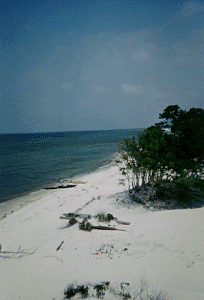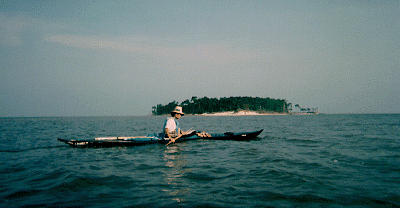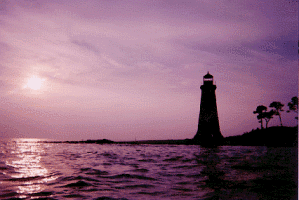GASP! Gulf Area Sea Paddlers
Cheerful Isles of Dementia -
Paddling Mississippi's Barrier Islands
copyright 1996 by Jackie Fenton
 We arrived at Shepard's Park in Gautier (pronounced "Go-sheay"),
Mississippi, after spending a couple of days on the road getting there
("there" in reality only being seven hours drive from Houston, but the
numerous gear shops and great Cajun food along the way were an
unavoidable impedance for an earlier arrival to our final destination).
After scouting the area between Ocean Springs and Gautier for the best
place to launch and paddle out to one of the many barrier Islands,
Bob Myers and I (or maybe that was mostly "I") thought Shepard's Park
an excellent launching point, and Ocean Springs an excellent ending
point for one of us to hitch-hike back to the car (or was that for
"Bob" to hitchhike back to the car... oh well, I *did* saddle myself
with the difficult task of devising some kind of plan for retrieving
the car).
We arrived at Shepard's Park in Gautier (pronounced "Go-sheay"),
Mississippi, after spending a couple of days on the road getting there
("there" in reality only being seven hours drive from Houston, but the
numerous gear shops and great Cajun food along the way were an
unavoidable impedance for an earlier arrival to our final destination).
After scouting the area between Ocean Springs and Gautier for the best
place to launch and paddle out to one of the many barrier Islands,
Bob Myers and I (or maybe that was mostly "I") thought Shepard's Park
an excellent launching point, and Ocean Springs an excellent ending
point for one of us to hitch-hike back to the car (or was that for
"Bob" to hitchhike back to the car... oh well, I *did* saddle myself
with the difficult task of devising some kind of plan for retrieving
the car).
What we didn't know as we pitched the tent and sorted through gear,
was that our first night in Mississippi camped near the marsh and
among the tall pines serenaded by night birds and tree frogs would
also be filled with the accompanying sounds of the soft whistle of a
train moving in the distance, the familiar clickety-clack of the
wheels rolling along the trestles. How quaint. At least, so we
thought until the sounds came closer and closer, and soon we realized
our campsite was located about 150 yards from a well-traveled train
track. Well-traveled meaning a train came roaring through about every
20 minutes.... all night long... and the track intersected a nearby
road which required each train to declare it's approach with a
brain-numbing blow of the horn.
We (err, rather "I") stumbled about the next morning getting ready for
the crossing to Horn Island counting on several days of quiet retreat
from "civilization." Bob assembled the Khatsalano while I went in
search of the nearest fast-food coffee and breakfast to shake the
fog-brain symptom of a sleepless night. Assembling boat parts into a
reliable, sea-worthy vessel in my present state would most likely
have resulted in the contrary. Besides, the Khat had already bitten
me once drawing blood in an earlier taming session. This time, I let
Bob tackle the critter for a few days of island maneuvering.
When our launching did not take place as early as we had planned (does
it ever?), we decided to head for Round Island, which was about half
the distance to Horn Island's nearest point. We paddled out the mouth of the
Pascagoula River traveling eastward along the Mississippi shore then entered
the Mississippi Sound. Bob carried a brand new GPS, and I'd swear he
was logging our current location every fifty yards. I know the unit
now contains the entire route from Houston to Ocean Springs (yes,
there really are maps and highway signs available). I was content
with my compass and sighting landmarks. Then again, it's only been
since Christmas that I own a portable phone... thanks to Bob, of
course. I must admit, however, the GPS was a convenient navigational
aid when we headed back to the mainland at the end of our trip with
twelve miles to paddle and landmarks difficult to spot. What I hated
about the GPS, though, was that due to the currents in the Sound, we
were constantly drifting off-track and the GPS was constantly
reminding us of this fact. Normally, I would have paddled in a wide
curve, blissfully ignorant of the extra distance paddled and the
energy wasted as a result. However, we felt compelled to continually
correct our course. Seemed we were always pointed in some different
direction. Anyhow, on this day when we cleared the mouth of the
Pascagoula, Round Island was quite visible with it's tall pine trees
and appeared... well... round.
 Round Island is home to an abandoned lighthouse, ospreys, terns,
sanderlings, skimmers and a variety of other sea birds, and provides
a narrow sand bar reaching outward to the west like an outstretched
arm upon which rests many pelicans and seagulls. We pitched the tent
at the base of the lighthouse some 100 yards or so from the nearest
osprey's nest. While checking in at the visitor's center of the
Gulf Islands National Seashore in Ocean Springs, a park ranger had
explained to us that in 1994, no osprey chicks had survived the season.
After success in survival rates in 1995, when visitors were restricted
from camping near the nests, the program has been extended.
Round Island is home to an abandoned lighthouse, ospreys, terns,
sanderlings, skimmers and a variety of other sea birds, and provides
a narrow sand bar reaching outward to the west like an outstretched
arm upon which rests many pelicans and seagulls. We pitched the tent
at the base of the lighthouse some 100 yards or so from the nearest
osprey's nest. While checking in at the visitor's center of the
Gulf Islands National Seashore in Ocean Springs, a park ranger had
explained to us that in 1994, no osprey chicks had survived the season.
After success in survival rates in 1995, when visitors were restricted
from camping near the nests, the program has been extended.
As the sun began to disappear and while thinking we were going to have
this small island to ourselves, a boater appeared from the north and
landed onshore opposite the lighthouse from us and about 300 yards
from our camp. He seemed unaware of our presence as he occasionally
glanced at his watch as if expecting company. Fifteen minutes passed
and another boat arrived from the west side of the island. What was
curious was the fact that the sun had set, the lighting had dimmed,
and the boaters were running without any lights. There were two
aboard, obviously drunk, and the boat engine repeatedly died. They
anchored near shore to the west of us, stepped awkwardly out of the
boat mostly falling into the water and stumbled across the sand in our
direction looking every bit like two drowned rats. As they approached
our camp, each with a beer can in his hand, one of the drowned rats
asked if I had a light for his cigarette. I said no. They proceeded
up to the lighthouse and entered the open doorway.
Immediately spotting the two new arrivals, the other boater approached
our campsite and began to engage Bob and me in small talk as he walked
past us, deliberately ignoring the other two who had now exited the
lighthouse and began to follow him. He walked towards the west side
of the island in the direction of the anchored second boat. When the
two drowned rats met up with the first boater, something was passed
between the three, and then they immediately parted. The first boater
returned to his boat and left the island, the other two boaters
stumbled back to their boat and attempted to leave. At first, I
thought we were going to be sharing the island with them for the night
as they had a difficult time keeping the boat motor running. Finally,
the engine co-operated and the drowned rats vanished into the
twilight, still without lights.
 Seemed a strange contradiction of impressions with the pelicans
gliding across the air, inches above the water, the piercing call of
the ospreys as they settled into their nests for the night, the soft
sound of the delicate surf rolling towards shore. All this interrupted
by the "drop" which had just taken place punctuating the abandonment
of the Round Island lighthouse, a structure ravaged by decades of
storm surges and neglect, littered with beer bottles and cans around
its base, graffiti on the wall, debris which included large sections
of carpet weighed down and partially buried along the shore by
massive deposits of sand. These islands are constantly on the move
westward, a huge shifting mound of fine quartz spilling out of the
mouth of the Mississippi River carried by the Gulf Stream and fierce
storms. Eventually, all the man-made trivia will be removed,
re-deposited, re-buried in its continuous journey propelled by the sea.
Seemed a strange contradiction of impressions with the pelicans
gliding across the air, inches above the water, the piercing call of
the ospreys as they settled into their nests for the night, the soft
sound of the delicate surf rolling towards shore. All this interrupted
by the "drop" which had just taken place punctuating the abandonment
of the Round Island lighthouse, a structure ravaged by decades of
storm surges and neglect, littered with beer bottles and cans around
its base, graffiti on the wall, debris which included large sections
of carpet weighed down and partially buried along the shore by
massive deposits of sand. These islands are constantly on the move
westward, a huge shifting mound of fine quartz spilling out of the
mouth of the Mississippi River carried by the Gulf Stream and fierce
storms. Eventually, all the man-made trivia will be removed,
re-deposited, re-buried in its continuous journey propelled by the sea.
As night came, so did the biting bugs... vicious and mean biters. We
retreated hastily to the tent. The stars were bright against a dark,
hazy sky. A cool, light breeze whispered over the island and through
the trees, surrounding the tent, gently and playfully raising and lowering
the fly against the tent wall. I listened to the night and could hear the
faint sound of a train whistle in the distance... miles away. I
closed my eyes secure in the knowledge that no train would be blasting
any horns only 150 yards away from me on this night.
Continue to the next page.
Return to GASP's Home Page.
 We arrived at Shepard's Park in Gautier (pronounced "Go-sheay"),
Mississippi, after spending a couple of days on the road getting there
("there" in reality only being seven hours drive from Houston, but the
numerous gear shops and great Cajun food along the way were an
unavoidable impedance for an earlier arrival to our final destination).
After scouting the area between Ocean Springs and Gautier for the best
place to launch and paddle out to one of the many barrier Islands,
Bob Myers and I (or maybe that was mostly "I") thought Shepard's Park
an excellent launching point, and Ocean Springs an excellent ending
point for one of us to hitch-hike back to the car (or was that for
"Bob" to hitchhike back to the car... oh well, I *did* saddle myself
with the difficult task of devising some kind of plan for retrieving
the car).
We arrived at Shepard's Park in Gautier (pronounced "Go-sheay"),
Mississippi, after spending a couple of days on the road getting there
("there" in reality only being seven hours drive from Houston, but the
numerous gear shops and great Cajun food along the way were an
unavoidable impedance for an earlier arrival to our final destination).
After scouting the area between Ocean Springs and Gautier for the best
place to launch and paddle out to one of the many barrier Islands,
Bob Myers and I (or maybe that was mostly "I") thought Shepard's Park
an excellent launching point, and Ocean Springs an excellent ending
point for one of us to hitch-hike back to the car (or was that for
"Bob" to hitchhike back to the car... oh well, I *did* saddle myself
with the difficult task of devising some kind of plan for retrieving
the car).  Round Island is home to an abandoned lighthouse, ospreys, terns,
sanderlings, skimmers and a variety of other sea birds, and provides
a narrow sand bar reaching outward to the west like an outstretched
arm upon which rests many pelicans and seagulls. We pitched the tent
at the base of the lighthouse some 100 yards or so from the nearest
osprey's nest. While checking in at the visitor's center of the
Gulf Islands National Seashore in Ocean Springs, a park ranger had
explained to us that in 1994, no osprey chicks had survived the season.
After success in survival rates in 1995, when visitors were restricted
from camping near the nests, the program has been extended.
Round Island is home to an abandoned lighthouse, ospreys, terns,
sanderlings, skimmers and a variety of other sea birds, and provides
a narrow sand bar reaching outward to the west like an outstretched
arm upon which rests many pelicans and seagulls. We pitched the tent
at the base of the lighthouse some 100 yards or so from the nearest
osprey's nest. While checking in at the visitor's center of the
Gulf Islands National Seashore in Ocean Springs, a park ranger had
explained to us that in 1994, no osprey chicks had survived the season.
After success in survival rates in 1995, when visitors were restricted
from camping near the nests, the program has been extended. Seemed a strange contradiction of impressions with the pelicans
gliding across the air, inches above the water, the piercing call of
the ospreys as they settled into their nests for the night, the soft
sound of the delicate surf rolling towards shore. All this interrupted
by the "drop" which had just taken place punctuating the abandonment
of the Round Island lighthouse, a structure ravaged by decades of
storm surges and neglect, littered with beer bottles and cans around
its base, graffiti on the wall, debris which included large sections
of carpet weighed down and partially buried along the shore by
massive deposits of sand. These islands are constantly on the move
westward, a huge shifting mound of fine quartz spilling out of the
mouth of the Mississippi River carried by the Gulf Stream and fierce
storms. Eventually, all the man-made trivia will be removed,
re-deposited, re-buried in its continuous journey propelled by the sea.
Seemed a strange contradiction of impressions with the pelicans
gliding across the air, inches above the water, the piercing call of
the ospreys as they settled into their nests for the night, the soft
sound of the delicate surf rolling towards shore. All this interrupted
by the "drop" which had just taken place punctuating the abandonment
of the Round Island lighthouse, a structure ravaged by decades of
storm surges and neglect, littered with beer bottles and cans around
its base, graffiti on the wall, debris which included large sections
of carpet weighed down and partially buried along the shore by
massive deposits of sand. These islands are constantly on the move
westward, a huge shifting mound of fine quartz spilling out of the
mouth of the Mississippi River carried by the Gulf Stream and fierce
storms. Eventually, all the man-made trivia will be removed,
re-deposited, re-buried in its continuous journey propelled by the sea.